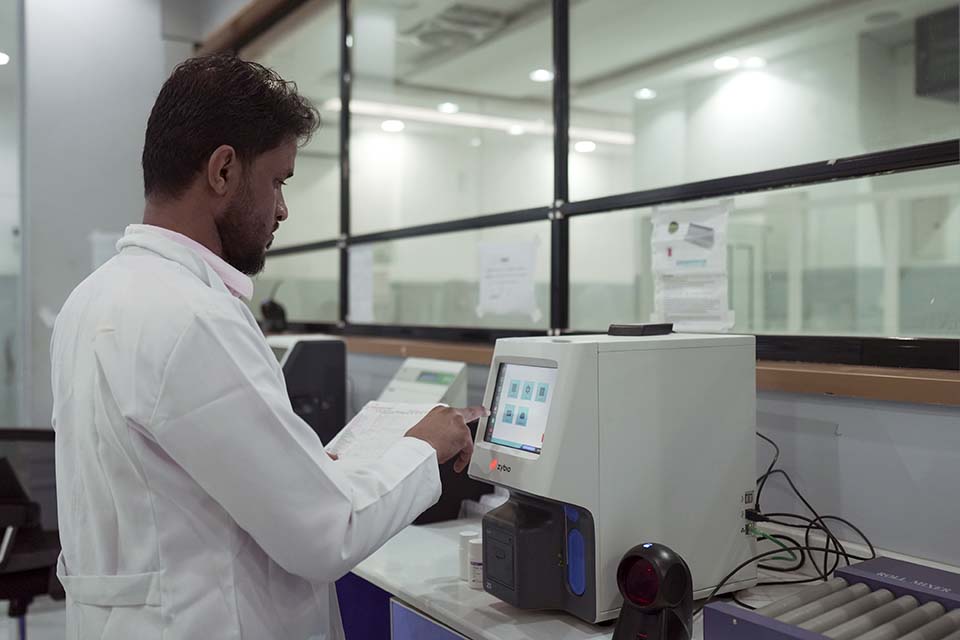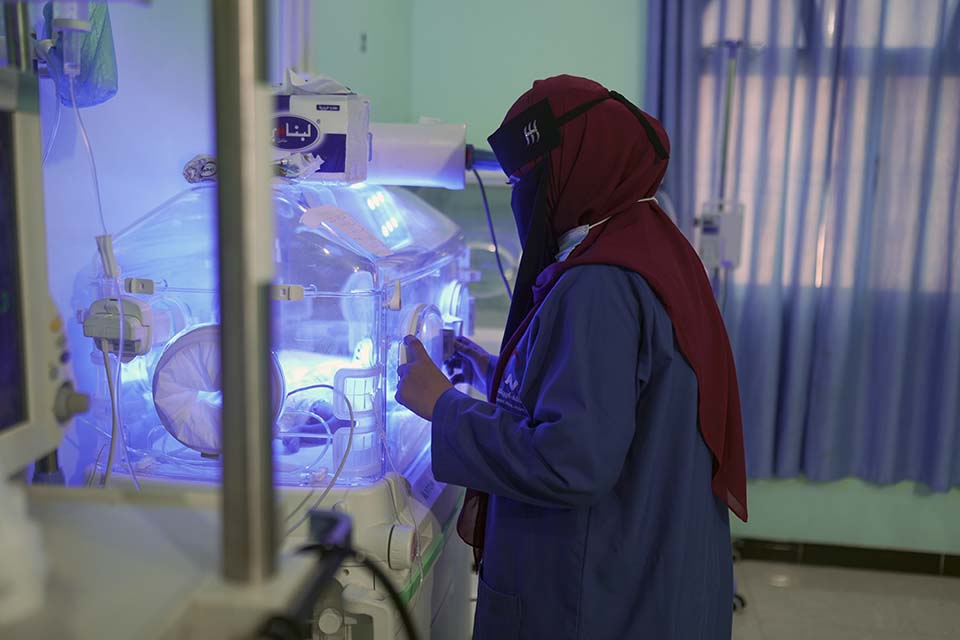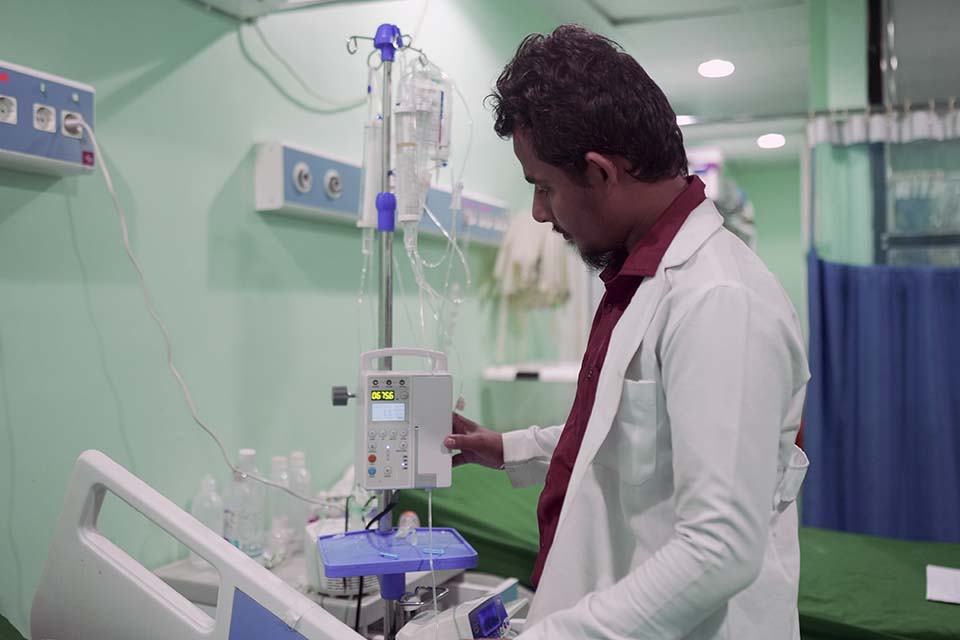

Youth Unemployment Tied to Health Care in Yemen
The Modern Arab Hospital in Aden, Yemen, has what you would expect to find in a full-service medical facility—an emergency department, operating rooms, an intensive care unit and other inpatient services. Modern Arab Hospital is one of a several hospitals in the area that serve a population of more than half a million people.
“Our hospital receives patients from all segments of society,” Dr. Ali Muhammed Al-Mehdar, a member of the hospital’s management board, says. “There is no discrimination among patients. We are committed to ensuring the accessibility of all medical services for everyone.”

Ahmed Hassan Ali works in the lab of the Modern Arab Hospital in Aden, Yemen.
Photo by Ali Najip Mohamed Ebrahim for CRS
Providing those services comes with challenges. Across Yemen, only 50% of health facilities are functioning. Hospitals and clinics face crippling shortages of staff, medication and equipment. Medical facilities are in dire need of staff members trained in both technical and soft skills. Dr. Al-Mehdar says he sees these issues at the Modern Arab Hospital, with many graduates in the health care field not having what it takes to deliver the high-quality care patients need.
“Many young graduate employees have the urge to take learning courses to improve their technical and educational level, yet they have constraints, such as financial constraints and managing time between the facility where they work and the institute where they receive their training,” Dr. Al-Mehdar says. As a result, overstretched health facilities struggle to find qualified staff, even as the youth unemployment rate in Yemen exceeds 25%.
Catholic Relief Services and Education for Employment, a network of local organizations promoting youth employment in the Middle East and North Africa, are meeting this dual challenge, addressing youth unemployment and helping strengthen the health system.
“Beyond the immediate economic benefits, addressing youth unemployment cultivates a dynamic and diversified workforce, driving innovation, entrepreneurship and economic competitiveness,” Ameen Alqadr, CEO of Education for Employment in Yemen, says. “In envisioning a prosperous future, we recognize that a gainfully employed and engaged youth population is the key to overall progress and stability in Yemen."
With support from Catholic Relief Services, Education for Employment offers training to young women and men to better equip them for the job market and links them to employment opportunities at partner health facilities such as the Modern Arab Hospital.
“CRS and Education for Employment have partnered for over four years to support young people in Yemen and address a critical gap in the health system,” Usama Saleh, country manager of CRS in Yemen, says. “The program helps young people to secure a livelihood and support their family, while also bringing qualified staff into Yemen’s health care system to help address urgent needs amid the conflict, and to rebuild for a better future.”
One former participant of the employment program is Reem Ahmed Saeed, who now works as a nurse at Modern Arab Hospital.

Reem Ahmed Saeed takes care of an infant at the Modern Arab Hospital in Aden, Yemen.
Photo by Ali Najip Mohamed Ebrahim for CRS
“I love my work as a nurse midwife,” Reem says. “I like serving people and helping them understand and alleviate their pain.”
Reem attended a variety of classes through the program, including English for medical purposes, computer skills and success in the workplace. Before the classes, Reem says, she lacked self-confidence and had trouble communicating with others effectively.
“Fortunately, taking the workplace success course was our first step toward communicating with people from other locations and jobs,” Reem says.
Overall, Reem says the courses gave her the skills she needed to secure employment. That’s what Ahmed Hassan Ali, anesthetic technician, experienced as well. He studied at Education for Employment, and says the classes contributed significantly to his professional success.
“When looking for jobs, adding abilities such as the English language boosts your curriculum vitae,” Ahmed says. “The highlight of my experience after completing the training was being promoted from a nurse in the operating theater department at Al-Gumhuria Hospital to a nurse in the intensive care unit—and then being the head of the intensive care unit.”
"Education for Employment brings positive change to the lives of unemployed youth," Mona Al-Mekhalfi, CRS program officer says. "After graduation and employment, Education for Employment's participants become an integral part of the organization—even several years after graduation.”

Ahmed Hassan Ali works as an anesthetic technician in Yemen.
Photo by Ali Najip Mohamed Ebrahim for CRS
For Dr. Al-Mehdi, the difference in employees who go through the training is obvious.
“In our … collaboration with Education for Employment, we observed that young graduates who accessed training courses succeed in improving their level of self-confidence and effectiveness and quality of health care services,” Dr. Al-Mehdi says.
For Ahmed, he hopes to continue to look for advancement opportunities, and hopes that more young people in Yemen have the chance to pursue medical careers.
“I wish that all my brothers and family in Lahj governorate are considering a career in nursing so that they can help patients in the same way that I do,” Ahmed says.

